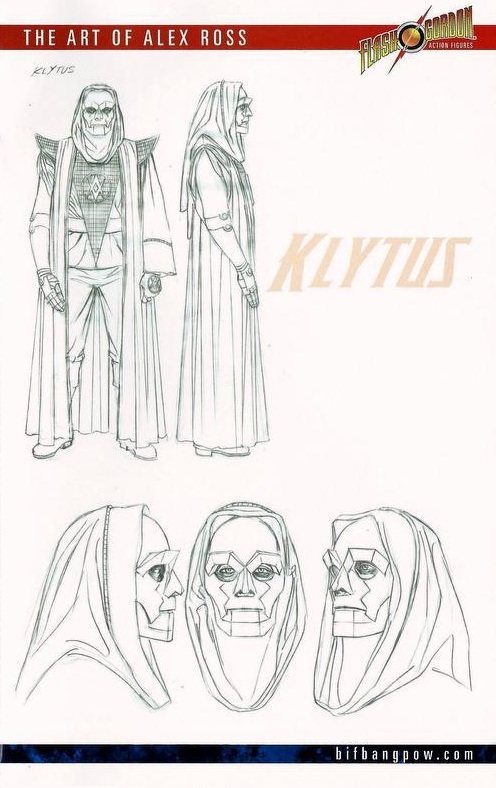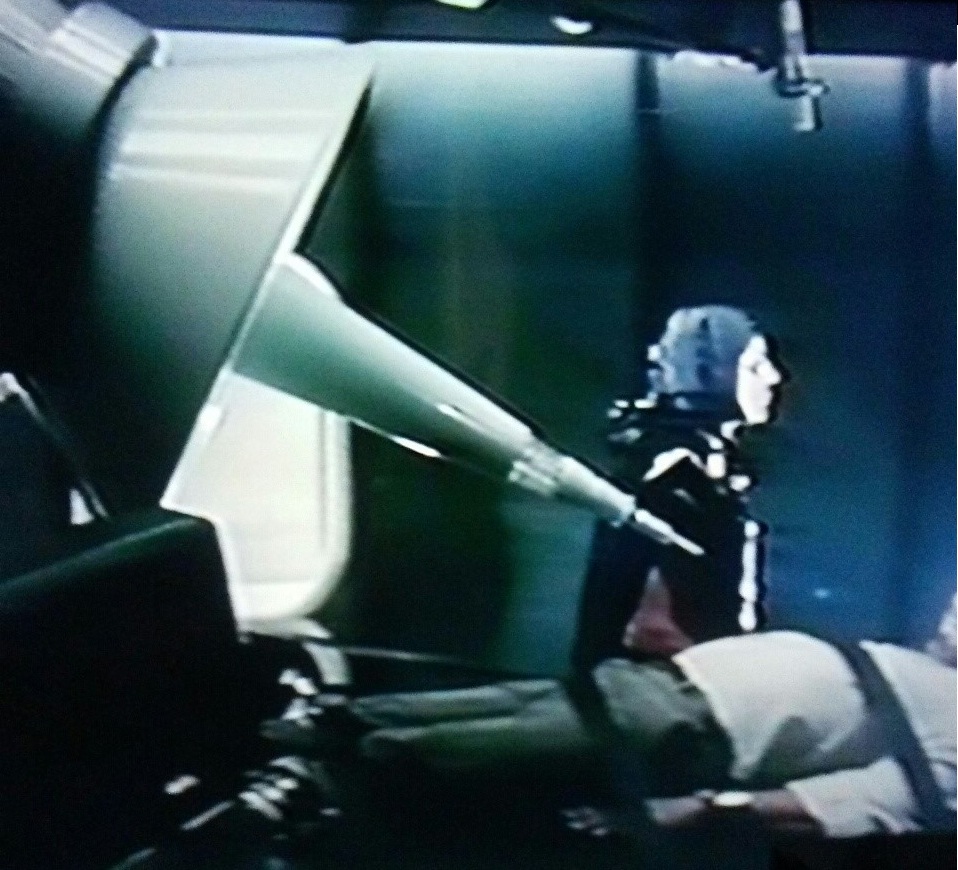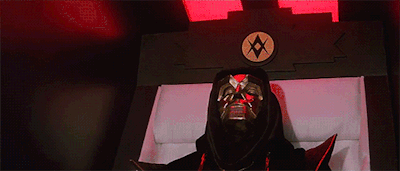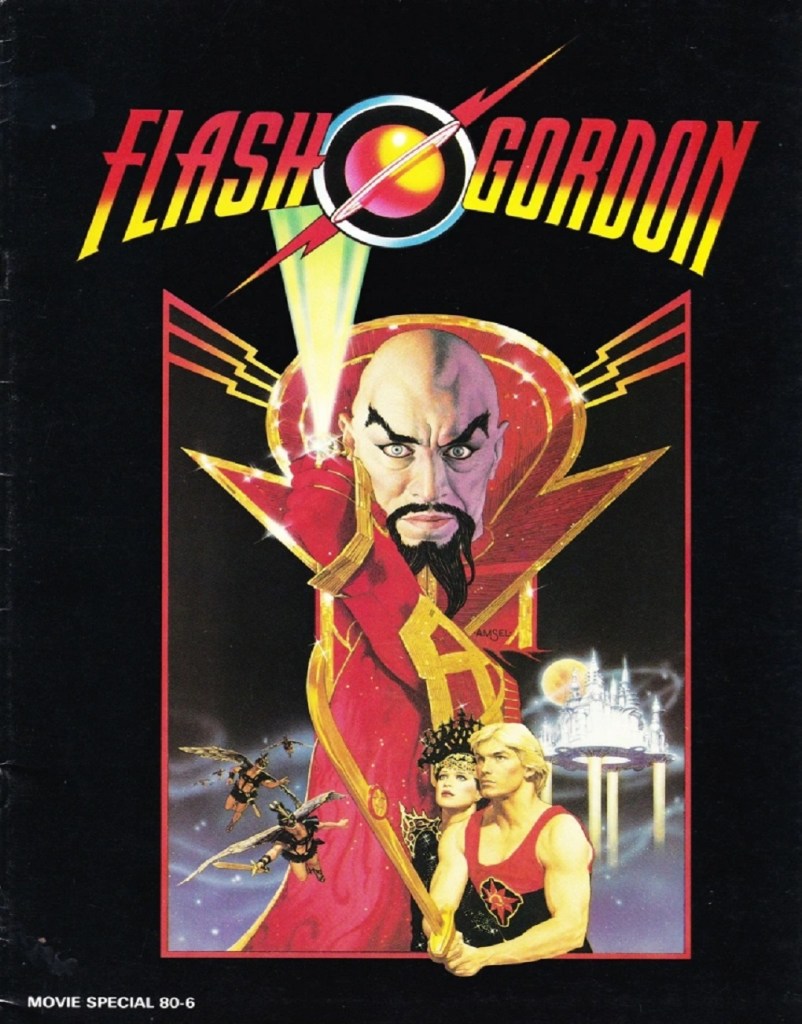
“Bring me the Bore Worms!” General Klytus
After almost a year’s detailed and intensive preparation, Dino De Laurentiis’ production of Flash Gordon started shooting in England on Monday, August 6th, 1979. The highly ambitious space epic, designed by Danilo Donati was spread over six sound stages at Shepperton Studios, the entire ‘Star Wars’ facility at EMI Borehamwood, plus a large complex at Brooklands, Surrey.
The cast chosen by De Laurentiis and Mike Hodges had a distinctly international flavour and featured talents both young and old to the movie industry. twenty-six year old American, Sam J. Jones, only 10 months a professional actor, portrayed the legendary Flash Gordon, whilst the part of Dale Arden is played by Canadian-born actress, Melody Anderson.
Sweden’s Max Von Sydow dug deeply into his repertoire of menace to portray Emperor Ming the Merciless. The role of Doctor Hans Zarkov, nuclear scientist who foresees the final destruction of the Planet Earth and attempts to stop it, was played by Chaim Topol.
From Italy came two of Europe’s brightest prospects. Ornella Muti was the mysterious Princess Aura and Mariangela Melato played the callous Kala of Ming’s secret police.
Among the British actors, Prince Vultan – leader of the Hawkmen, was played by Brian Blessed. Timothy Dalton, with a list of film, television and film credits behind him was chosen as Prince Barin of Arboria, with Peter Wyngarde portraying General Klytus, the controller of the Mongo Secret Police Force.
Emperor Ming the Merciless declares that he will first play with and then destroy the Earth using natural disasters. On Earth, New York Jets football star “Flash” Gordon boards a small plane, where he meets travel journalist Dale Arden. Mid-flight, the cockpit is hit by a meteorite and the pilots are lost. Flash takes control and manages to crash land into a greenhouse owned by Dr. Hans Zarkov. Zarkov, who believes the disasters are being caused because an unknown source is pushing the Moon towards Earth, has secretly constructed a spacecraft which he plans to use to investigate. Zarkov’s assistant refuses to go, so he lures Flash and Dale aboard. The rocket launches, taking them to the planet Mongo, where they are captured by Ming’s troops.
The three are brought before Ming. He orders Dale be prepared for his pleasure. Flash tries to resist, but is overpowered. Ming orders Zarkov be reprogrammed and Flash executed. Ming’s daughter, Princess Aura, seduces Ming’s surgeon into saving Flash, to whom she is attracted. As they escape, Flash sees Zarkov being brainwashed by Klytus, the metal-faced head of the secret police. Aura and Flash flee to Arboria, kingdom of Prince Barin, Aura’s lover. En route, Aura teaches Flash to use a telepathic communicator to contact Dale. He lets her know he is alive. Dale is locked in Ming’s bedchamber, but encouraged by Flash, she escapes. Klytus sends Zarkov to intercept Dale, who tells him and Klytus that Flash is alive. They then escape, as Zarkov reveals he resisted the brainwashing. They are captured by Prince Vultan’s Hawkmen and taken to Sky City.

Aura and Flash arrive at Arboria. Aura asks the Prince to keep Flash safe. A distrustful Barin, in love with Aura, agrees not to kill Flash, but then forces him to perform a deadly ritual. Barin and Flash take turns sticking their hands into a hollow stump with a giant scorpion-like Wood Beast inside. When Flash has to take an extra turn, he pretends to be stung as a distraction and escapes. Barin follows, but they are both captured by the Hawkmen.
Right: Original drawings of General Klytus by Alex Ross.
Klytus informs Ming that Flash is alive and is given authority to find out who is responsible. Aura returns and is taken prisoner and tortured by Klytus and General Kala. They force her to confess and Ming banishes her to the ice moon Frigia after his wedding. Meanwhile, Flash and Barin are taken to Sky City, where Flash and Dale are briefly reunited. Flash is forced to fight Barin to the death, but Barin joins him when Flash saves his life. Klytus arrives and Flash and Barin kill him. Knowing that this will bring retribution, Vultan orders the Hawkmen to evacuate, leaving Barin, Flash, Dale and Zarkov behind. Ming’s ship arrives and he orders Barin, Zarkov and Dale to be taken aboard. Ming is impressed with Flash, and offers him lordship over Earth in exchange for loyalty, which Flash refuses. Ming gives the order to destroy Vultan’s kingdom along with Flash. Flash finds a rocket cycle and escapes before Sky City is destroyed.
Flash contacts Vultan, who is hiding on Arboria and they plot an attack on Mingo City. Flash pretends to attack Mingo City alone on his rocket cycle. General Kala dispatches the war rocket Ajax to kill Flash, but the Hawkmen ambush and seize the rocket. Meanwhile, Princess Aura overpowers her guard and frees Barin and Zarkov from the execution chamber. Flash and the Hawkmen attack Mingo City in Ajax and Kala activates the defenses, as Ming and Dale’s wedding begins. Mingo City’s lightning field can only be penetrated by flying Ajax into it at a suicidal speed. Flash volunteers to stay at the helm to ensure success and allow the Hawkmen to invade the city.

Left: Peter minus Klytus mask during a run-though of the Zarkov “Mind-Draining Scene”
Barin and Zarkov enter the control room to stop the lightning field, encountering Kala who refuses to deactivate it. She attempts to kill Zarkov, but Barin shoots and kills her. Without Kala they are unable to deactivate the field from that control room. Barin tells Zarkov to hold the fort while he heads to Sector Alpha. Zarkov keeps trying, but is unable to deactivate the shield.
Barin fights through Ming’s guards and gets to Sector Alpha and deactivates the lightning field before Ajax hits it. Flash flies the rocket ship into the city’s wedding hall and the ship’s bow impales Ming. He falls off the rocket nose, seriously wounded and Flash offers to spare his life if he will stop the attack on Earth, but Ming refuses. Ming attempts to use his power ring on Flash, but his power falters and nothing happens. He then aims the ring at himself and is seemingly vaporised by its remaining power seconds before the counter to the destruction of the Earth reaches zero. A huge victory celebration ensues.
Barin and Aura become the new leaders in Ming’s place. Barin names Vultan the leader of their armies. Flash, Dale, and Zarkov discuss returning to Earth. Zarkov says he doesn’t know how they will get back, but they will try. Barin tells them all they’re welcome to stay, but Dale says she’s a New York City girl, and it’s now too quiet around Mongo.
The final frame shows Ming’s ring being picked up by the hand of an unseen person. Ming’s laugh echoes as the credits roll. Following the credits the text “The End” is shown on the screen before a question mark(?) is appended.

Facts and Figures
Initially, producer De Laurentiis wanted Italian director Federicao Fellini to direct the picture; Although Fellini optioned the Flash Gordon rights from De Laurentiis, he never made the film. Having attempted to make a Flash Gordon film in the 1970s; unable to acquire the rights from De Laurentiis, Lucas decided to create Star Wars instead. De Laurentiis then hired Nicolas Roeg to make the film. Roeg, an admirer of the original Alex Raymond comic strips, spent a year in pre-production work. However, De Laurentiis was unhappy with Roeg’s treatment of Flash Gordon, and Roeg left the project. De Laurentiis also considered hiring Sergio Leone to direct the Flash Gordon film; Leone refused, because he believed the script was not faithful to the original Raymond comic strips. De Laurentiis then hired Mike Hodges to direct.
Lorenzo Semple, Jr wrote the script, and recalled: “Dino wanted to make Flash Gordon humorous. At the time, I thought that was a possible way to go, but, in hindsight, I realise it was a terrible mistake. We kept fiddling around with the script, trying to decide whether to be funny or realistic. That was a catastrophic thing to do, with so much money involved… I never thought the character of Flash in the script was particularly good. But there was no pressure to make it any better. Dino had a vision of a comic-strip character treated in a comic style. That was silly, because Flash Gordon was never intended to be funny. The entire film got way out of control”.
According to a 2012 interview in Maxim, Sam J. Jones had disagreements of some sort with De Laurentiis and departed prior to post-production, which resulted in a substantial proportion of his dialogue being dubbed by a professional voice actor, whose identity is still a mystery.
A sequel was proposed, but the departure of Jones effectively ended any such prospects. The airfield scene at the beginning of the film, although set in the U.S., was shot at the Broadford Airfield in Skye, Scotland.
Flash Gordon, in total, grossed well above double its $20 million budget, grossing $27,107,960 in North America, which was augmented by a very strong showing in the United Kingdom, grossing nearly £14 million (c. $22 million in 1980 dollars) there. Additionally, the film performed well in Italy, due to the two Italian actors prominent in the credits. The film found appreciation with the majority of critics, notably The New Yorker’s Pauline Kael. Kael described Flash Gordon as having “some of the knowing, pleasurable giddiness of the fast-moving Bonds.The director, Mike Hodges, gets right into comic-strip sensibility and pacing”. Von Sydow (Ming) received a good deal of praise for his performance, but Jones (Gordon) was nominated for a Golden Raspberry Award for Worst Actor. Before the film’s run in theatres, a sequel was considered and according to Brian Blessed on the Region 2 DVD commentary for Flash Gordon – Silver Anniversary Edition, the sequel was going to be set on Mars, as a possible update of the Buster Crabbe serials.
Timeline
Flash Gordon has since become a cult classic with fans of science fiction and fantasy. It is a favourite of director Edgar Wright, who used the film as one of the visual influences for Scott Pilgrim vs. The World. Acclaimed comic book artist Alex Ross names the film as his favourite film of all time. He painted the cover of the film’s 2007 “Saviour of the Universe Edition” DVD release, and starred in a featurette to talk extensively about his affection for the film. In Seth MacFarlane’s 2012 comedy Ted, the characters of Ted and John are fans of the film, and it is referenced several times throughout the film. Jones (playing himself) also appears in the film during a manic party sequence and in the film’s conclusion. He also appears in the sequel, Ted 2. Horror punk musician Wednesday 13 based the song “Hail Ming” on his 2013 album The Dixie Dead on the film.
Blessed’s performance as Prince Vultan lodged the veteran stage and screen actor into the UK collective consciousness for the utterance of a single line – “Gordon’s alive?!” – which, more than 30 years later, remains the most repeated, reused, and recycled quotation from both the film and Blessed’s career.
The Dynamite Entertainment comic Flash Gordon: Zeitgeist drew on several elements of the 1980 film, including the reappearance of the villain Klytus (who does not appear in the original comic strips). In this adaptation, Klytus again serves as Ming’s main henchman. The 2014 Dynamite Flash Gordon comic also contained several allusions to the film, including having Vultan speak the line “Gordon’s alive?!”.
The film was originally released in North America via Universal Studios. Universal has retained the domestic theatrical and home video rights, while the international rights passed on through different distributors, eventually landing with StudioCanal. However, the film’s UK distributor, Thorn EMI, controlled U.S TV rights. Although StudioCanal now holds those rights due to ownership of the EMI film library, they licensed them to MGM for U.S syndication, which explains why MGM’s logo appears on current television airings.

A comic book adaptation, written by Bruce Jones and illustrated by classic Flash Gordon artist Al Williamson (himself not a fan of the movie due to its overall campy nature, numerous script changes and resulting alterations to his artwork), was released by Western Publishing to coincide with the film’s release. It was serialised in three issues of the Flash Gordon comic book (No. 31–33) and released in a single large format softcover and hardcover editions.
A novelization by Arthur Byron Cover of the movie script by Lorenzo Semple Jr. was published in 1980.
A video game adaptation for the Atari 2600 was developed by Sirius Software and published by 20th Century Fox Games in 1983.
The film was released in 1981 on VHS, Betamax and MCA DiscoVision, and re-released in 1998 on both LaserDisc and Region 1 DVD via Universal. It was released in Region 2 in 2001 (Japan) and again in 2005 (UK/Europe); with the 2005 release including commentary by Brian Blessed winning the “Commentary of the Year” award from Hotdog Magazine for his humour and enthusiasm.
In October 2007, a high definition transfer of the film premiered on the MGM HD cable/satellite channel.
In November 2007, Sam J. Jones and Melody Anderson together created a new commentary track for the StudioCanal DVD edition of the film. Flash Gordon was released on Blu-Ray on 15 June 2010.
2019 saw the release of the documentary, ‘Life After Flash’ on DVD and BluRay.
‘Flash Gordon – The Official Story Of The Film’ was published in November 2020 by Titan Books.
Also in 2020, it was announced in the British press that ‘Flash Gordon’ was Queen Elizabeth II favourite film.
In 2021, a 40th Anniversary 4K BluRay collectors box set was released.
Reviews
“But above all these is Peter Wyngarde who plays Ming’s evil sidekick and confidante Klytus. His delivery and tone is perfect, shame he’s only in it for an hour…” R2
“Lively comic strip addition to the increasing numbers of such things at enormous expense fifty years after their prime.” Halliwell’s Film Guide.
“Klytus is actually my favourite character, with his (relatively) calm demeanour and restrained performance. Even with his entire head encased in gold-plated plastic, one can taste the withering sneer every time he says “Pathetic…” Jonathan Ross, Film Critic.

PROMOTIONAL BROCHURES


Above: Japanese – Cover and inside


Above: American – Cover and inside
Listen to Howard Blakes orchestral version of the Flash Gordon soundtrack here
Click below for more on ‘Flash Gordon’…


3 thoughts on “REVIEW: Flash Gordon”